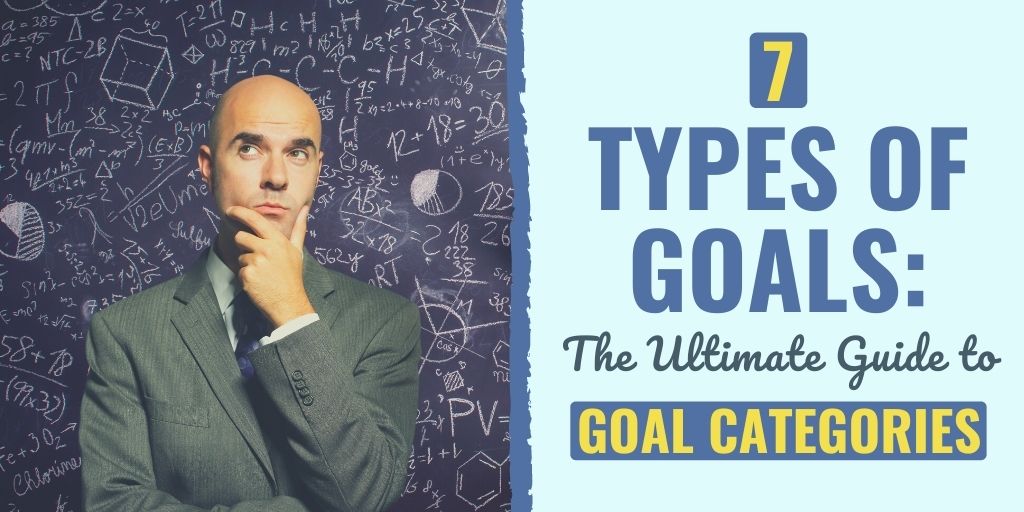Setting goals is crucial for getting all that you want from life. This includes finding success in your relationships, career and overall physical and mental well-being. None of these things would be possible with a roadmap for how to get there… and a time frame for doing so.
Goals may change over time, and they should allow room for detours. What matters is that you reach your destination.
Goals can be short-term, medium-term or long-term. Medium-term are among the most common, as they generally take 1-3 years to complete… which should be plenty of time to achieve most things on your “to do” list – such as a job promotion, saving for a downpayment on a house or getting married.
But before you can start setting effective goals, you need to understand the types of goals out there.
Simply put: there are seven different categories of goals.
If you are confused about the different types of goals and which styles might be best for your situation, then you are in the right place!
In this post, we'll talk about the seven major goals that help with your personal development journey. Once you’ve read it, there’ll be no stopping you!
Let's get to it…
What are Goals?
First things first, let’s take a look at the term “goals”. Many people automatically equate goals with grandiose moves that have life-changing implications.
They assume that all goals should include a significant change in finances, achieving massive success or changing society (even the world) in some important way.
This is not true.
Major goals, like the ones above, could be your goal… there is nothing wrong with that. But goals are often much more personal and simplistic – especially the ones that stick.
For example, one of my lifelong goals is simply to run a marathon in every state in the US. This goal combines my love of fitness and travel into one major goal (I've done 20 out of 50 so far).
The point is that all goals do not need to be massive. If you think the only goals worthwhile are earth-shattering ones, you might want to change your thinking.
Later on in this article I will go into greater detail about the different types of goals.
The reason most people never reach their goals is that they don’t define them, or ever seriously consider them as believable or achievable.
– Denis Waitley, The Psychology of Winning
The 7 Types of Goal Setting
There are seven types of goals. Many goals can be set from a single section, or a single goal from each one. It all depends on the priorities of the individual.
To be “well rounded”, you will be best served by mixing things up a bit and not JUST focus on a single target. But ultimately any decision on where to put your effort is yours and yours alone. Don’t let anybody tell you any different.
These are not cookie-cutter decisions that require one from each category. They are choices based on your life.
So let’s get to the seven types of goals.
#1. Career Goals
This is most commonly what people think about then they think, “Goal setting activities”. After all, according to a study put out by Gettysburg College, we spend on average one third of our life (or 90,000 hours) working.
So it’s only natural that career goals are top of mind for most people when they think about the different types of goals they should be working towards.
For many, our job is our life. It affects everything else we do and how we feel. If you’re lucky enough to have a job you love, you’ll be a happier and more pleasant person to be around. Conversely, if you hate your job, your family and friends will likely suffer the consequences.
So, yes, career goals are definitely important… but not necessarily the most importantto everyone. Priorities come into play when deciding which goals to pursue.
Career goals should focus on how to:
If you would like to create great career goals, then I recommend checking out these 36 work habits that will help you become a better employee.
For more specific examples, check out these articles:
#2. Financial Goals
This is another big goal choice. It is common to want to make more money and plan ways to do that. To reach financial goals you need to budget, adjust spending habits, save as much money as possible, and hopefully make more money.

With financial goals you will focus on how to:
Financial security means being able to afford the things we want and need from life. This can be a big house, nice car, luxury vacations and an Ivy League education for the kids. It means food on the table, brand name clothes and dinners out with friends.
Yet, not everyone has this luxury… so their financial goals may be slightly different. Instead of saving for a home, for instance, they may realize that they are living beyond their means and need to downsize.
There is no one financial goal that will work for everyone. The theme; however, is to make smart choices financially and set realistic marks for your situation.
People struggling financially may also choose to focus on more personal goals, realizing that their mental and physical health are more important.
#3. Personal Development Goals
Personal development goals are the ones that are about making you a better person. This is not a judgment. These goals are more about making a choice that you believe will improve your life… and perhaps make you more interesting.
For example, if you only speak one language… I’m not thinking any less of you. That said, if you feel the need or desire to learn another language, then I’ll respect you because it is an important goal for you to achieve.
Personal development goal examples:
Many people who set personal development goals may aspire to go on a game show, such as Jeopardy, or simply want to be that interesting person at a party that everyone wants to chat with.
#4. Spiritual Goals
What can you do for your spirit? What can bring you authentic happiness? These can be religious goals for any religion. They can be goals that help you contribute to society.
These include any goals that are about more than yourself and your immediate family.
Examples of spiritual goals:
Spiritual goals are about giving, not receiving. It’s about putting yourself and your faith out into the universe and expecting nothing back in return.
You simply do these things to feel good and make an impact. Helping others will lift their spirits, which in turn triggers those endorphins in our brains that cause happiness.
These goals are also about tuning the world out for a while and focusing on your heart’s desires. If you want to live a meaningful life, check out the spiritual goals examples in this post.
#5. Leisure Goals
Setting leisure goals gives you an opportunity to focus on your skills, hobbies, and passions. You may even get the chance to engage with your community in some way.

Whether you’re playing in a local softball league, or are a spectator at a football game, having leisure goals is an important part of living a well-rounded life.
Not everyone has the same idea of what a leisure activity is. For example, I love to golf, but know many people who can’t stand it. I also enjoy playing music and want to learn to play the drums. These are things I find relaxing and worth spending my time doing.
Participating in a leisure activity should enrich your life, while also giving you the chance to learn new skills. These activities are also effective stress reducers and present you with the chance to meet other people who share common interests.
Examples of leisure goals:
For some people, setting leisure goals goes further than simply becoming a new hobby… it could become a part-time career. I have a good friend who retired from teaching and is now making and selling her own necklaces. You never know!
To get started with selecting leisure goals, take a few minutes to check out these articles:
#6. Relationship Goals
Relationship goals are so important to our happiness. Everyone needs companionship, whether romantic or plutonic. We are humans and wired that way.
These types of goals are designed to make ourselves the kind of person others want to be around; but, they are also about finding your match in a life partner or friend. Relationship goals can also be about being the best parent you can be.
A few relationship goals are:
Relationship goals often commingle with career and leisure goals. For instance, deciding to cut back your hours at the office will allow you to spend more time hiking with your family.
#7. Physical and Mental Health Goals
If you do not make your physical and mental health a priority, you may not live long enough to actually see your goals come to fruition. It’s a harsh reality, but one that we all need to hear.
Being in excellent physical shape doesn’t necessarily mean you have no curves, six pack abs and zero body fat. What it does mean is that your heart and lungs are working properly. Your joints are healthy. Your weight and BMI is in a healthy range.
Physical fitness also promotes better mental health, as exercise is proven to help alleviate stress and anxiety. And anxiety is a primary culprit in health issues such as high blood pressure, heart disease, insomnia and decreased memory function.
Common physical and mental health goals are:
Physical and mental fitness go hand-in-hand. That is why it’s important to have goals for yourself that promote living your healthiest life.
Final Thoughts on Seven Type of Goals
Each one of the seven goals outlined here can be used for standalone inspiration – or can work in conjunction with each other. In fact, as we discussed, there will be times when one type of goal may bleed into or depend on another.
You should strive to be a well-rounded person who has goals related to your career, relationship, finances, and personal life.
Or why not all of these seven areas?
Setting a few different types of goals doesn’t mean they all have to be big ones. The important thing to remember is that you can rarely be happy in one area if another is falling short of your expectations.
A good goal-oriented planner can help you get started on determining what your primary goals are. Here are our favorite goal-setting planners.
To get started, I recommend setting what are called S.M.A.R.T. goals, which can be broken down as follows:
| S | Specific making sure that the goal is clear as written. |
| M | Measurable Making sure that any metric requirement in the goal is clearly defined and has specific numbers attached to it. |
| A | Achievable. Meaning that the goal can be accomplished and is not some crazy “pie in the sky” dream-like tripping your salary in three months or losing 50 pounds in a month. |
| R | Relevant, and this just means that the goal really matters and is worth your time and effort. |
| T | Time-bound where the goal starts and stops (and any steps along the way) are all tied to specific dates. |
If you'd like to learn more about this concept, grab a free S.M.A.R.T. goal setting worksheet. And if you'd like to learn how to build any skills related to your goals, then I recommend this resource that has over 25,000 self-educational courses on their platform. (You may also use the WOPP goal setting strategy alongside SMART goals.)
If you need more convincing, learn about the power of creating big hairy audacious goals and how they can change your life.
Finally, if you want to take your goal-setting efforts to the next level, check out this FREE printable worksheet and a step-by-step process that will help you set effective SMART goals.

Nicole Krause has been writing both personally and professionally for over 20 years. She holds a dual B.A. in English and Film Studies. Her work has appeared in some of the country’s top publications, major news outlets, online publications, and blogs. As a happily married (and extremely busy) mother of four… her articles primarily focus on parenting, marriage, family, finance, organization, and product reviews.



This is a great read. You have covered almost everything about goal setting. Being in the personal development industry myself, I love a lot about goal setting. And you have opened my eyes explaining and giving such insightful information on setting a goal.
It is true that we need to have goals from all areas in our lives, or else we will feel ’empty’ or ‘not complete’.
The stepping stone goals are extremely important because they are what will determine the achievement of our long-term goals.
Thanks for sharing. Cheers. 🙂
Love it! My brain really appreciated your ability to write concisely and make the formatting of the article/ steps clear with goal setting through font, colour and charts. The examples you shared were practical and doable. Gratitude. And good luck on your marathons around the States!
Hi Scott,
After knowing what goal I should achieve, now I realized the right procedure to put forward the goals. In fact I wrote the list and later I could find this article which has come from an expert. Thank you.
Regards,
Vasudev